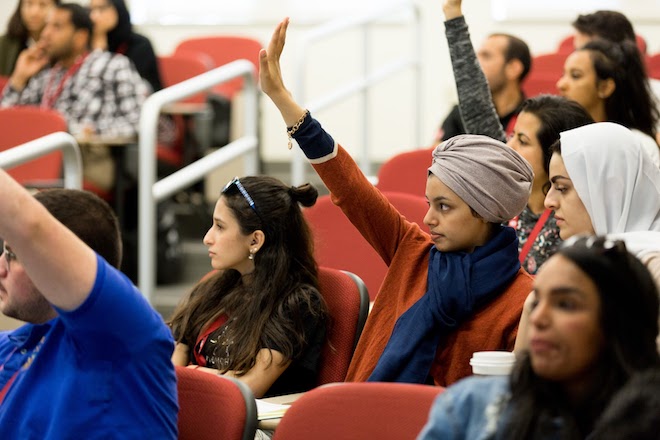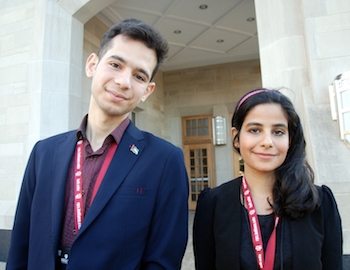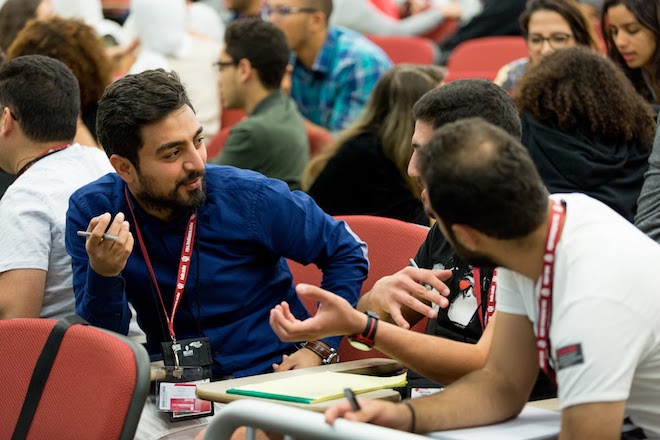
Women make up over half the students in the Global Business Institute, which includes students from seven countries across the Middle East and North Africa. This is the sixth year of the program. Anna Teeter photo
They come from across the Middle East and North Africa. They have widely diverse backgrounds and interests. But one thing unites the 100 college students who come to Indiana University’s Kelley School of Business every year to take part in the Global Business Institute: a desire to learn American business practices they can take back and put to use in their home countries.
The institute, sponsored since 2012 by the U.S. State Department and the Coca-Cola Company, is designed to spark entrepreneurship and increase economic opportunities for young people, says LaVonn Schlegel, executive director of the Institute for International Business, which runs the program. Schlegel tells Poets&Quants that the rigorous month-long program, taught by Kelley faculty, includes core business fundamentals as well as learning about soft skills — teamwork, problem solving, presentation, networking — and is highlighted by a pair of field trips to Washington, D.C., and Coca-Cola headquarters in Atlanta, Georgia. The students also meet with leaders at several Indiana startups and volunteer with a local Habitat for Humanity chapter for lessons in social entrepreneurship.
“It’s always been a very rigorous program — there’s nothing about this program that’s been a vacation,” says Schlegel, adding that this year’s class — chosen from about 7,000 applicants — hails from Tunisia, Morocco, Algeria, Egypt, the Palestinian territories, Jordan, and Saudi Arabia, while previous classes included students from Pakistan and Afghanistan as well. In all, there are about 300 Global Business Institute alumni who have finished college and another 200 still in school.
“These kids get here, they start in the classroom, they start with cases, they start working on team-building — it’s a very hard program. And every year it seems that the students that we are selecting are even stronger than the year before.”
A POSITIVE IMPACT ON THE REGION

Global Business Institute students Iyad Ghazal, left, of the Palestinian territories, and Rahaf Alraddodi, of Saudi Arabia George Vlahakis photo
The Global Business Institute is the brainchild of Kelley alum Curt Ferguson, former president of Coca-Cola operations in the Middle East and North Africa, who saw the high unemployment of young people in the region — in some countries as high as 50%; a 2017 Arab Youth Survey places youth unemployment across the region at around 30% — and approached his alma mater with the idea of doing something about it. In its five complete years, the program has had an unquestionable impact, with 110 businesses launched and 95% of participants finding employment within three months of returning home. Eight-five of those companies are still going, including one in Kabul, Afghanistan, that employs 70 people, eight more that employ at least 16 people, and another 17 that employ between six and 15.
Meanwhile, that spark of entrepreneurship is turning into a flame, with 62% of alumni reporting entrepreneurial activities in their communities or universities.
“In the first year, the people that applied to the program — great students, smart people, capable, all of those things — but they didn’t really have any of the buzz about the program,” Schlegel says. “They didn’t know what to expect. Now these kids are going back to their home countries and they’re talking about not only how hard it is, but how beneficial it is, how rigorous it is. So the students that are self-selecting to apply have just gotten stronger and stronger over the years, and you see that in the positive results when they return home.”
If not new businesses, institute alumni are pursuing further education — another goal of the program. Among the alumni, 77 have received scholarships to pursue advanced degrees abroad, including 13 Fulbright Scholars. And there have been huge honors, too — one GBI alumnus from Pakistan, Syed Faizan Hussain, was recently honored by the queen of England for his work to support the use of technology in health-related solutions.
CHALLENGES AND OPPORTUNITIES
A current student, Rahaf Alraddodi, 23, described her aspirations to IU’s news service for an article on the GBI published last month. Alraddodi is part of the first GBI class to be more than 50% women; now finishing up her degree in human resource management at Yanbu University College in Saudi Arabia, she hopes to pursue an MBA in the U.S. in a couple of years — perhaps at Kelley. “This is a really good start, to learn just how Americans handle businesses and how to mix the two — Saudi or Arab with the American way,” she says.
Of course, there will be challenges for Alraddodi — just as there have been for many participants in the GBI. Change comes slowly in some sectors in the Middle East and North Africa, and in her native Saudi Arabia, women still face more hurdles in exploring business opportunities than men. Still, she says, options for women are on the rise, and families, government, and companies are more supportive of women getting a university education. “Women are more open,” Alraddodi says. “They want to try new things and just want to be thrown into this new pool and learn how to swim. I think it’s really changing.”
The GBI is changing, too. Adds Schlegel: “When we first got started, we were only about 35% women in the program, and now we’re over the 50% mark. We’ve worked very hard to make it an equal opportunity for men and women. We sometimes come across cultural challenges, but I would argue that the students manage those better themselves. We set some basic standards here about the way we treat each other — we have women teaching in the program just like we have men — and every now and then we have to deal with a different cultural perspective, but for the most part the biggest challenge has just been getting the numbers up to where we’re 50-50.”
TAUGHT ‘TO DO THE THINGS THAT IT ACTUALLY TAKES TO START A COMPANY’
Teamwork is the overarching theme of the institute. Over the course of the month, in competition with each other, the students work in teams to create a feasibility plan; on the last day, as a capstone to the program, they present their plans to judges that include faculty and business representatives.
What do the winners get?
“We don’t give them any money, we don’t give them any access, we don’t give them anything other than a ‘Job well done,'” Schlegel says. “Because of that, they see this entire process as a learning opportunity, and they walk away with those skills that will help them present their ideas and innovate.
“That’s why I think our program is so strong — even though it’s an entrepreneurship program, and we’ve got great entrepreneurship numbers coming out of it, startups and all of that, that’s not our focus. We don’t tell them that what you’re going to leave here with is a finished business plan that you can go pitch to venture capitalists. We make sure they have the soft skills to sell their ideas, to figure out what their passions are, to ask the hard questions, to do the things that it takes to actually start a company.”

Students from Tunisia, Morocco, Algeria, Egypt, the Palestinian territories, Jordan, and Saudi Arabia make up the sixth class to come to IU Bloomington for the Global Business Institute. Anna Teeter photo
DON’T MISS THE AGONY & THE ECSTASY OF CASE COMPETITIONS and WHARTON STUDENTS TREK TO ANTARCTICA FOR LEADERSHIP TRAINING











Questions about this article? Email us or leave a comment below.